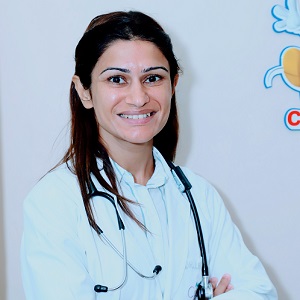An allergy is an issue related to our immune system. Most allergic reactions occur when our immune system reacts to something harmful to our body. Our human body is designed to defend itself against harmful microbes like bacteria and viruses. However, it can sometimes violently defend itself against mild things like mould, pollen, or dust.
Allergens are mostly harmless but can be harmful to someone allergic to them. The body attacks the allergens when it comes into contact with it by producing antibodies known as immunoglobulin E (IgE). The allergens entering our body stick to these antibodies and produce chemicals called histamine, which causes an allergic reaction.
What are the Symptoms of Pediatric Allergy
Allergic reactions can occur anywhere on the body, including the eyes, skin, stomach lining, throat, lungs, nose, and sinuses. Most allergies are very irritating and if not managed, can affect the quality of your life. Allergic reactions cause several symptoms such as:
- Red, watery, and itchy eyes
- Sneezing, stuffy nose, runny nose, itching in the roof of the mouth or ears
- Itchy, red, dry skin
- Itchy welts or hives
- Rash
- Coughing, wheezing, or shortness of breath
Anaphylaxis is a life-threatening allergic reaction to allergens (such as peanuts or bee stings) that requires emergency medical care. Symptoms of anaphylaxis include vomiting, persistent coughing, trouble breathing, diarrhoea, fainting, low BP, or death.
What are the Causes of Pediatric Allergy
Allergens enter our bodies through the air we breathe in. They enter our nose, throat, sinuses, and lungs. They can also enter through direct physical contact with your skin. They may also be ingested through food. The common allergens that trigger allergic reactions include:
- Mould
- Pollen
- Dust mites
- Feathers
- Animal dander, saliva, or urine
- Insect stings
- Foods such as peanuts, soybeans, wheat, etc.
- Medicines
- Cockroaches
When to see a doctor?
Allergic reactions occur as a response to an allergen that enters our body. If you notice any symptoms in your child, get in touch with your doctor for timely treatment. In case of a severe allergic reaction known as anaphylaxis, seek urgent medical care and take your child to the hospital immediately. Talk to your healthcare provider if you believe your child has an allergy.
What are the Treatment Options for Pediatric Allergy
The course of treatment for your child’s pediatric allergic will depend on the severity of the reaction. Some standard treatment options include:
Antihistamines
Antihistamines block the action of histamines in our body. This stops allergy symptoms. Doctors usually prescribe antihistamine tablets, eye drops, nasal drops or syrup to children if they have a moderate to mild allergic reaction such as swelling, tingling mouth, or skin rash. If your child has an allergy, you must keep an antihistamine tablet or syrup in your first aid kit all the time.
Some commonly prescribed antihistamines to treat allergies include
- Azelastine eye drops (Optivar)
- Azelastine nasal sprays (Astelin, Astepro)
- Carbinoxamine (Palgic)
- Cyproheptadine
Over-the-counter (OTC) antihistamines include:
- Cetirizine (Zyrtec)
- Clemastine (Tavist)
- Brompheniramine (Dimetane)
Immunotherapy
Your pediatrician may recommend immunotherapy if your child has persistent, severe, and troublesome allergies due to dust mites, grass pollen, or insect bites. While performing immunotherapy, your child will be given small doses of the substance or allergen causing the allergy. This causes the body to become less sensitive to the allergen, eventually reducing allergy symptoms.
Before performing immunotherapy, your doctor will examine all the factors that trigger an allergy in your child. Your child may also need to undergo some blood and skin tests.
Other Treatments for Pediatric Allergy
Other treatments might be required depending on the type of allergic reaction.
- If your child has eczema, he may need corticosteroid ointment.
- For hay fever, your child may require corticosteroid nose sprays.
- For asthma. he/she may require inhalers such as Asmol or Ventolin
How Can I Prevent Pediatric Allergy?
The best way to keep pediatric allergic reactions at bay is to avoid the allergens that cause them. This can be done by:
- Stay indoors during windy days and seasons when the pollen count is higher.
- Controlling the amount of dust in your home.
- Using air conditioners instead of opening windows.
- Using a dehumidifier in damp parts of your home.
- Changing clothes and Taking soap showers after an outdoor game or physical activity.
Conclusion
Allergies cannot be cured, but their symptoms can be effectively managed. The best way to deal with the condition is to stay away from allergens. Talk with your kid about their allergies and what they should and shouldn't do if they suffer an allergic reaction. Inform all the caregivers, including teachers, friends’ parents, family members, etc., about their allergies.
Request an appointment at Apollo Cradle, Amritsar - Abadi Court Road. Call 1860-500-4424 to book an appointment.
Allergies often occur at the same time each year. Allergic coughs and colds usually last about a week.
Vitamin C is a potent antioxidant and is highly effective in reducing the severity of your allergic reactions. Taking Vitamin C regularly during the allergy season can slow down the body’s overreaction to environmental triggers.
This is not true! It is just the opposite. We get allergic reactions when our immune system reacts too strongly to an allergen. This shows that our immune system is working quite well.
Most allergies usually take a lot of time to develop. It may seem as if your child is suddenly experiencing allergy symptoms, but allergies take significant time to develop.
Our Doctors
Treatments
- Anaesthesia & Pain Management
- General Pediatrics
- Growth Chart
- Newborn Screening Test
- Pediatric Allergy
- Pediatric Dermatology
- Pediatric Endocrinology
- Pediatric Nutrition
- Pediatric Orthopedics
- Pediatric Psychology
- Pediatric Surgery & Urology
- ROP Screening Tests
- Stem Cell Banking
- Vaccination/Immunisation Schedule

 94% Patient Satisfaction Score
94% Patient Satisfaction Score
